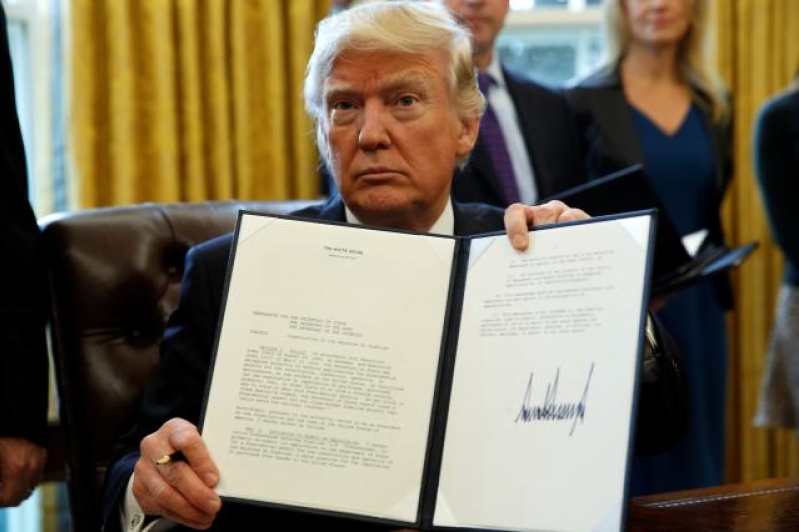
The power of executive order is, I have noted, often regarded with a suspicious eye---almost as though it somehow originated from some great transgression or horrendous governmental conspiracy. Despite the sense of notoriety, however, some will be surprised to learn that the executive order is actually backed both by the Constitution as well as by history. Beginning, in fact, with our country's first president, founding father, and general.
The first executive order was signed by George Washington April 22,1793, in order to enable federal officers to prevent citizens from interfering with the then-war between England and France. Later, in 1861, Abraham Lincoln again utilized its power 48 times. Between the both of them, the power of executive order was summoned a total of 56 times. This number only continued to increase with coming presidents. Theodore Roosevelt, in fact, was the first to reach the thousand-mark. In his eight-year duration, President Barack Obama reached 275. Now President Donald Trump, in the White House for nearly a week, has signed four. The concern that many are suddenly posing: But is it Constitutional?
According to David Barton, founder and president of Wallbuilders, assessing the correctness or incorrectness of an order begins with recognizing the source of government. While many even within the conservative realm are quick to equate the term "Constitution" with "government," Barton contends, with supporting quotes from men involved in the original Convention that changed everything, the two are not synonymous. Barton enlightens with a quote from John F. Mercer:
"It is a great mistake to suppose that the paper we are to propose will govern the United States. It is not the Constitution, but the men whom it will bring into the government, and interest they have in maintaining it, that are to govern them. The paper will only mark out the mode and the form. Men are the substance and must do the business."
Barton clarifies that while the Constitution is our guiding authority, Mercer and his contemporaries understood that ultimately, men are the ones who govern. Therefore, it is crucial that the character of a man reflect the kind of governing desirable to the people. He must be a lawful man who, transcending above and beyond the legal details of the Constitution, also reflects an attitude of protection over the populace's inalienable rights.
The executive order is assumed by two references contained within our founding document. Article II, Section 2 of the Constitution first delineates the president as the "executive power," with Section 3 stating simply the intent binding the power, "...that the laws be faithfully executed." Executive Orders are indeed Constitutional when hinged upon at least one understanding: that is, the order must never transgress a right positively expressed in the Constitution.
If an executive order impinges upon another's clearly designated freedoms---such as the freedom of religion or the right to Life, for example---then it should be deemed unconstitutional and contrary to the spirit of historical context and intent. One prominent illustration is provided in the ObamaCare mandate and its usurpation of religious freedom. Companies and those affiliated with strong convictions otherwise were forced to provide birth control for their employees.The order neither protected the right to religious conscientiousness, nor did it stand to check the president's power. In such a case, the invalidity of such an order is certain.
At other times, an executive order may be promoted as a kind of illegality-undoing, or reversal, of unconstitutional orders. While this piece is too brief to review every one of President Trump's executive orders up to date, his order to defund International Planned Parenthood---of relieving people their laden consciences in funding an act contrary to the right of Life---would count as just an example. In fact, the Constitution would require such debunking. In order to distinguish between rights and matters of entitlement, the founding fathers emphasized again and again the term "natural rights." Simply, these are the inherent values of humanity---life, liberty, and the pursuit of happiness----endowed by a good and loving Creator. To enforce funding which executes the fundamental right to life is not only a transgression of inalienable rights, but a trespass upon an individual's conscientiousness, as well.







